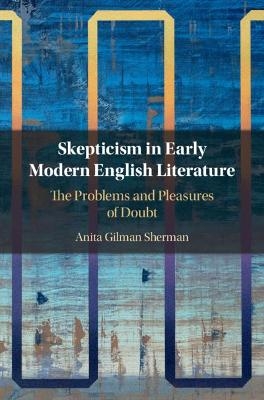
Skepticism in Early Modern English Literature
The Problems and Pleasures of Doubt
Seiten
2021
Cambridge University Press (Verlag)
978-1-108-84266-2 (ISBN)
Cambridge University Press (Verlag)
978-1-108-84266-2 (ISBN)
Skeptical doubt – a foundation of modernity – inspired the burst of artistic creativity illuminating the age of Shakespeare. Literary and philosophical innovation flourished when writers like Spenser, Shakespeare, Donne, Cavendish, Marvell and Milton channeled their skeptical questions and doubts, forever changing the face of English literature.
This ambitious account of skepticism's effects on major authors of England's Golden Age shows how key philosophical problems inspired literary innovations in poetry and prose. When figures like Spenser, Shakespeare, Donne, Herbert of Cherbury, Cavendish, Marvell and Milton question theories of language, degrees of knowledge and belief, and dwell on the uncertainties of perception, they forever change English literature, ushering it into a secular mode. While tracing a narrative arc from medieval nominalism to late seventeenth-century taste, the book explores the aesthetic pleasures and political quandaries induced by skeptical doubt. It also incorporates modern philosophical views of skepticism: those of Stanley Cavell, Ludwig Wittgenstein, Roland Barthes, and Hans Blumenberg, among others. The book thus contributes to interdisciplinary studies of philosophy and literature as well as to current debates about skepticism as a secularizing force, fostering civil liberties and religious freedoms.
This ambitious account of skepticism's effects on major authors of England's Golden Age shows how key philosophical problems inspired literary innovations in poetry and prose. When figures like Spenser, Shakespeare, Donne, Herbert of Cherbury, Cavendish, Marvell and Milton question theories of language, degrees of knowledge and belief, and dwell on the uncertainties of perception, they forever change English literature, ushering it into a secular mode. While tracing a narrative arc from medieval nominalism to late seventeenth-century taste, the book explores the aesthetic pleasures and political quandaries induced by skeptical doubt. It also incorporates modern philosophical views of skepticism: those of Stanley Cavell, Ludwig Wittgenstein, Roland Barthes, and Hans Blumenberg, among others. The book thus contributes to interdisciplinary studies of philosophy and literature as well as to current debates about skepticism as a secularizing force, fostering civil liberties and religious freedoms.
Anita Gilman Sherman is Associate Professor of Literature at American University, Washington, DC. She is the author of Skepticism and Memory in Shakespeare and Donne (2007) and has published articles on Montaigne, Garcilaso de la Vega, Thomas Heywood, W. G. Sebald, and others.
Introduction. Secularizing Skepticism?; 1. Visionary Interrupted: Spenser's Skeptical Artwork, 2. Fantasies of Private Language: Shakespeare's 'The Phoenix and Turtle' and Donne's 'The Ecstasy'; 3. Conformity/Neutrality in Lord Herbert of Cherbury; 4. The Skeptical Fancies of Margaret Cavendish: Reoccupation; 5. The Enchantments of Andrew Marvell: Skepticism and Taste; Afterword. Experience in Crisis: Milton's Samson Agonistes.
| Erscheinungsdatum | 19.04.2021 |
|---|---|
| Zusatzinfo | Worked examples or Exercises |
| Verlagsort | Cambridge |
| Sprache | englisch |
| Maße | 230 x 150 mm |
| Gewicht | 560 g |
| Themenwelt | Geisteswissenschaften ► Sprach- / Literaturwissenschaft ► Anglistik / Amerikanistik |
| Geisteswissenschaften ► Sprach- / Literaturwissenschaft ► Literaturgeschichte | |
| Geisteswissenschaften ► Sprach- / Literaturwissenschaft ► Literaturwissenschaft | |
| ISBN-10 | 1-108-84266-6 / 1108842666 |
| ISBN-13 | 978-1-108-84266-2 / 9781108842662 |
| Zustand | Neuware |
| Haben Sie eine Frage zum Produkt? |
Mehr entdecken
aus dem Bereich
aus dem Bereich
Poetik eines sozialen Urteils
Buch | Hardcover (2023)
De Gruyter (Verlag)
59,95 €
Buch | Softcover (2024)
belleville (Verlag)
20,00 €


